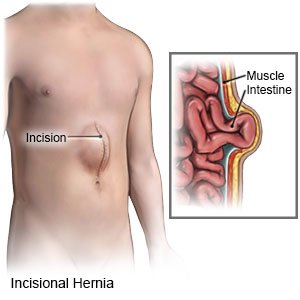Incisional Hernia
Medically reviewed by Drugs.com. Last updated on Aug 4, 2025.
An incisional hernia is a bulge through the healed incision of a past surgery in your abdomen. An incisional hernia is usually caused by a weakened area in the abdominal tissues and muscles. The bulge forms when a part of your intestine pushes through this weakness. Abdominal tissues, organs, or fat may also slip through.
 |
DISCHARGE INSTRUCTIONS:
Seek care immediately if:
- Your hernia gets bigger, feels firm, or turns blue or purple.
- You have severe abdominal pain with nausea or vomiting.
- Your abdomen is larger than usual.
- Your heart beats faster than usual.
- You see blood in your bowel movement.
- You are unable to have a bowel movement or pass gas.
Call your doctor if:
- You have a fever.
- You have nausea and are vomiting.
- You are constipated.
- Your hernia returns.
- You have a lump or collection of fluid under your skin.
- You have pain that does not go away, even after you take pain medicine.
- You have questions or concerns about your condition or care.
Medicines:
You may need any of the following:
- NSAIDs , such as ibuprofen, help decrease swelling, pain, and fever. This medicine is available with or without a doctor's order. NSAIDs can cause stomach bleeding or kidney problems in certain people. If you take blood thinner medicine, always ask your healthcare provider if NSAIDs are safe for you. Always read the medicine label and follow directions.
- Acetaminophen decreases pain and fever. It is available without a doctor's order. Ask how much to take and how often to take it. Follow directions. Read the labels of all other medicines you are using to see if they also contain acetaminophen, or ask your doctor or pharmacist. Acetaminophen can cause liver damage if not taken correctly.
- Take your medicine as directed. Contact your healthcare provider if you think your medicine is not helping or if you have side effects. Tell your provider if you are allergic to any medicine. Keep a list of the medicines, vitamins, and herbs you take. Include the amounts, and when and why you take them. Bring the list or the pill bottles to follow-up visits. Carry your medicine list with you in case of an emergency.
Manage your symptoms and prevent another hernia:
- Maintain a healthy weight. Your healthcare provider will tell you what a healthy weight is for you. Your provider can help you create a weight loss plan, if needed.
- Do not strain. This includes when you have a bowel movement. Take an over-the-counter bowel movement softener and drink liquids as directed. Ask how much liquid to drink each day and which liquids are best for you. When you cough, hold a pillow against your incision to prevent strain.
- Eat foods high in fiber. Fiber may prevent constipation and straining during a bowel movement. Foods that contain fiber include fruits, vegetables, beans, lentils, and whole grains.

- Do not lift heavy objects. This can increase pressure on your abdominal muscles and make your hernia bigger or cause another hernia. Do not lift more than 10 pounds or do strenuous activity until your provider says it is okay.
- Wear an abdominal belt, if needed. An abdominal belt can provide support, reduce discomfort, and prevent your hernia from worsening. An abdominal belt may be used for up to 2 weeks after surgery. This may help decrease pain and the risk of fluid collecting under your skin. Ask your provider for instructions on how to apply and use an abdominal belt safely.
- Do not put pressure on your hernia. Do not push on the hernia or place tape or a coin over it.
- Do not smoke. Nicotine and other chemicals in cigarettes and cigars can weaken the abdominal wall and slow healing. This may increase your risk for another hernia. Ask your provider for information if you currently smoke and need help to quit. E-cigarettes or smokeless tobacco still contain nicotine. Talk to your provider before you use these products.
Follow up with your doctor as directed:
Write down your questions so you remember to ask them during your visits.
© Copyright Merative 2025 Information is for End User's use only and may not be sold, redistributed or otherwise used for commercial purposes.
The above information is an educational aid only. It is not intended as medical advice for individual conditions or treatments. Talk to your doctor, nurse or pharmacist before following any medical regimen to see if it is safe and effective for you.
Learn more about Incisional Hernia
Treatment options
Care guides
Symptoms and treatments
Further information
Always consult your healthcare provider to ensure the information displayed on this page applies to your personal circumstances.
